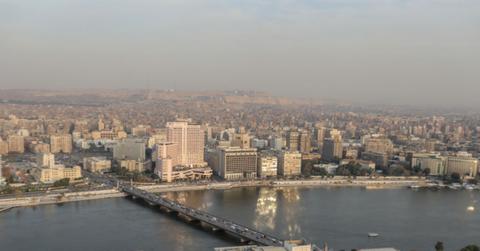Is the Nile River Drying Up? One of the World's Most Famous Rivers Is in Danger
Sep. 29 2023, Published 3:38 p.m. ET

The Gist:
- The Nile River is credited as the longest river in the world, per Guinness World Records.
- The Nile is essential for fishing and agriculture throughout Eastern Africa.
- Climate change and overuse are drying up the Nile River.
The Nile River begins as smaller rivers flowing into Lake Victoria and flows northward to empty into the Mediterranean. The river flows over 4,100 miles (6,600 kilometers) and is crucial to life in Egypt and much of eastern Africa.
Tragically, climate change is affecting these water levels, and the Nile River is drying up. Here's what you need to know about this urgent situation.

The Nile River is drying up.
The Nile River, which runs through Egypt and ten other African countries, is essential to the survival of the inhabitants of those nations. Unfortunately, climate change is largely to blame for the Nile River drying up, which is expected to worsen circumstances for millions of people.
According to France 24, UN forecasts warn that increased droughts and low rainfall levels could cause the river's flow to . The UN's prediction means a 75 percent water loss per inhabitant in the region. The flow of the Nile River already dropped from 3,000 cubic meters per second to 2,830 over the past 50 years.
Geologist and emeritus professor at Paris-8-Saint-Denis University Habib Ayeb told France 24, “Those who have the least water today will have even less tomorrow because competition for water will be even more fierce.” Political strife is also partly to blame for the water wars. Ayeb said that large agricultural businesses often receive priority for water resources rather than local inhabitants.

Why is the Nile River drying up?
In addition to droughts caused by climate change, another major reason for the Nile losing water levels is that Lake Victoria, the largest body of water that supplies water to the river, is at risk of completely disappearing. Besides rainfall, the lake is the largest source of the Nile's water. The World Economic Forum reports that the lake degrades due to "unsustainable land management, agricultural practices, and the discharge of untreated wastewater."
Per France 24, Lake Victoria is at risk of disappearing due to low precipitation, high levels of evaporation, and the tilt of the axis of the Earth. It could be dried up within 500 years, which would devastate the Nile River and its regions.
Sea levels are also rising, causing the saline waters of the Mediterranean Sea to encroach on the Nile River waters. That salt water pollutes land where crops are grown along the Nile River delta.

What will happen if the Nile River dries up?
The nation of Egypt is already facing an annual water deficit and will likely be considered "water scarce" by 2025, reports ABC News. The Grand Ethiopian Renaissance Dam (GERD) is also threatening the water supply of the Nile. Egyptian leaders worry Nile levels will fall even more if the GERD fills too quickly. However, Ethiopian officials claim the dam won't interfere with the water supply to either Egypt or Sudan.
Since millions depend on the Nile River for nourishment, growing crops, and fishing, a reduced river flow would be catastrophic. In addition, as France 24 explains, the river is a source of electricity for many countries in the region. Decreased rainfall causes lower water levels and, therefore, reduced hydroelectric production.